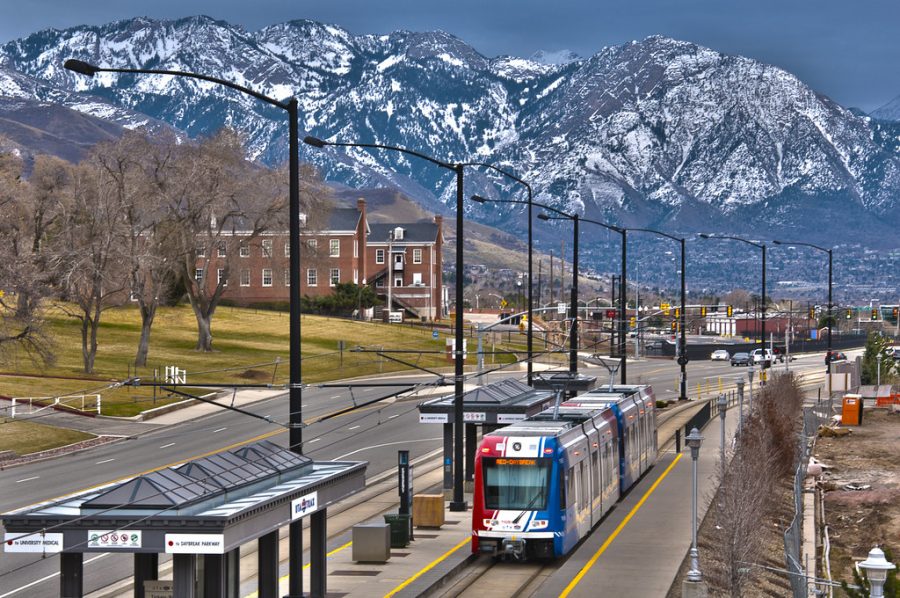Shadley: Fight For ‘Free Fares Forever,’ Forever
“TRAX Red Line to Daybreak at Fort Douglas Station” by vxla is licensed under CC BY 2.0
February 25, 2022
For all of February, Utah’s public transportation is completely free. Whether you’re a student at the U, a healthcare worker, a grocery store employee or simply a human being, your ability to move around the city and state will not be hindered by your financial situation. Without the barrier of fares, ridership across all UTA services has increased significantly. Systemwide, ridership has risen 20% on weekdays, 34% on Saturdays and 27% on Sundays. FrontRunner, UTA’s commuter rail that runs from Ogden to Provo, has seen the largest increase in ridership on Saturdays at 163%. Utahns have demonstrated a desire to use public transportation without fares in just three weeks.
Now, a bill in the Utah State Legislature, H.B. 164, would transform “Free Fare February” into “Free Fares Forever.” All UTA services would cost nothing to use, indefinitely. While we could have a free public transportation system as early as this legislative session, the bill faces some serious challenges that make it less likely to pass this time around. Primarily, the estimated $40-50 million needed to offset the revenue from fares has not been included in the governor’s annual budget. Still, the agitation for better public transportation in Utah is working. We have free transportation for a whole month, providing everyone with access to cleaner air and increased mobility, two basic human rights. And while they likely won’t be universal rights this legislative session, they will be eventually. We might not have “Free Fares Forever,” but we have to continue to push for “Free Fares Forever,” forever.
Transportation and Clean Air as a Human Right
We all have a right to full, healthy lives. Air pollution takes an average of two years off the life of every Utahn. Roughly 75% of Utahns lose at least one year of their lives and 23% — nearly one in four Utahns — lose five or more years of their lives.
When I sat down with Rep. Joel Briscoe, the sponsor of H.B. 164, to talk about his reasons for pushing for free public transportation, he said that they “revolve around clean air.” His wife suffers from asthma and on bad air quality days, “she will say it feels like having a five-pound weight on her chest every time she takes a breath.” The suffering of Rep. Briscoe’s wife, the suffering of “hundreds of thousands of Utahns” and all our loss of life stems from our unnecessary over-reliance on cars. A more robust, free public transportation system will drastically reduce air pollution.
Beyond the ability to breathe clean air, free public transportation offers increased mobility. Mobility limitations arise for anyone who cannot afford transportation. The difference between grocery shopping at 7/11 and Smith’s can be as simple as access to transportation. When people have greater mobility, they have greater access to food, shelter, healthcare and every other basic human right a city can offer. The most important factor for whether someone keeps their job, as Briscoe said, is whether or not “they had access to reliable transportation.” Public transportation allows people to move throughout the city, but it also grants them increased mobility in our economy.
Bending the Arc of Transportation Issues Towards Justice
I’ve written a lot about the need for better public transportation, free public transportation and increased mobility in Utah. Sometimes I feel like a broken record. It can be so frustrating to demand a more just society and repeatedly leave with only consolation prizes. But when “you think about all the great movements that have made America a more just society … they took decades, if not centuries.” Whether it’s the abolition, civil rights or environmental movement, they all “took a lot of people dedicated to that cause who just decided it was so important that they were going to give it their all to make sure it happened.”
No matter how far we go with public transportation, even if we have an incredible system, there will always be the need for activists to push for the maintenance and improvement of that system. This work is not about reaching a terminal destination, it’s about the process of always pushing public transportation access and quality in the right direction. And it seems to me that we’re doing that. Successfully. It’s not just about “Free Fares Forever,” today. Instead, it’s about advocating for “Free Fares Forever,” forever. That’s the goal of activism in public transportation, and, really, activism generally.
We don’t have the public transportation we deserve yet. It may not be this year, it may not be next year, but we’re getting there. We’ve just got to keep moving forward. Come along for the ride.








